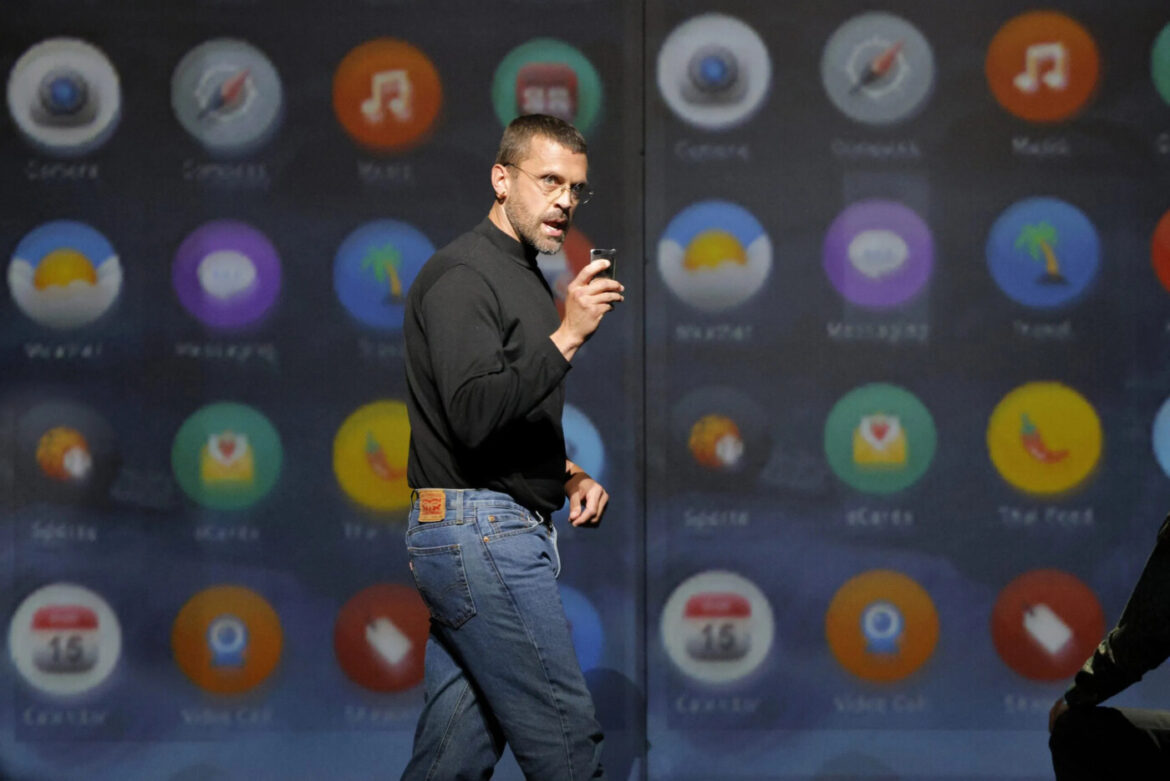“The (R)evolution of Steve Jobs” made its long-awaited San Francisco Opera debut Friday night in a dazzling production that delves deeply into the life and legacy of the tech titan who changed the world.
The title of the opera, by composer Mason Bates and librettist Mark Campbell, isn’t merely a catchy play on words. Moving forward on twin tracks, the work integrates themes both personal and political, presenting in 95 intermissionless minutes Jobs’ revolutionary contributions to modern life as the founder of Apple and inventor of the iPhone, even as it illuminates the wreckage of his corrosive relationships with family, friends and co-workers.

The opera, a co-commission by the San Francisco, Santa Fe and Seattle operas with support from Cal Performances and co-produced by Indiana University’s Jacobs School of Music, had its world premiere at Santa Fe Opera in 2017, and has had revivals around the country since then. Friday’s premiere felt like a homecoming of sorts: Bates, a longtime Bay Area resident, sets the opera around the region, from the Jobs family home in Los Altos to Apple’s corporate headquarters in Cupertino.
From the start, Jobs is clearly an exceptional individual, one who seems destined to make exceptional things; we see him on his 10th birthday, receiving a wooden workbench from his father. From there, it’s a steady rise to the moment Jobs launches the first iPhone: the elegant “one device” that will change the world.
Yet Jobs, who is devoted to minimalism — one character notes that his home has almost no furniture in it — is also an absolutist. Carefree early scenes with fellow tech enthusiast Steve Wozniak and sage advice from Zen Buddhist monk Kōbun Chino Otogawa stand in contrast with Jobs’ dark moments: his heartless rejection of longtime girlfriend Chrisann, his abrupt severance of ties with Wozniak, the complete alienation of Apple friends and co-workers. One powerful scene, set amid a company meeting in Cupertino, shows the faithful on the brink of mutiny. “You’ve become one of the people we hated,” sings a devastated Wozniak.


Yet Jobs achieves a kind of redemption in his marriage to Laurene Powell Jobs, whose kindness helps to steer him to something like a peaceful end.
Driven by Bates’ surging score, conducted by Michael Christie with forward thrust throughout, Campbell’s libretto articulates the verbal exchanges without lingering, and director Kevin Newbury makes the transitions from scene to scene feel seamless.
The production, featuring sets by Victoria (Vita) Tzykun, lighting by Japhy Weideman, sound and mixing by Rick Jacobsohn, projections by Ben Pearcy, and costumes by Paul Carey, yields eye-catching visuals throughout.
Bates, whose works are familiar to Bay Area audiences mostly through his appearances at the San Francisco Symphony, employs his facility with electronic music in ways befitting the opera’s setting; in these performances, he joins Christie and the San Francisco Opera Orchestra in the pit to perform the score’s electronic components.

And his writing for the individual voices yields characterful work — forceful outbursts for Jobs, lyrical passages for Laurene, and soothing lines set to strings, bells and chimes for Otogawa.
John Moore made an impressive company debut as Jobs, his robust baritone sounding authoritative in his early scenes and acquiring a mellower tone as the opera approached its finale. Mezzo-soprano Sasha Cooke, who has defined the role of Laurene since the opera’s world premiere in Santa Fe, contributed moments of grace and sublime vocal radiance. Bass Wei Wu was an attractively smooth-voiced Otogawa, Olivia Smith an aptly agitated Chrisann, and tenor Bille Bruley made an indelible company debut as Wozniak.
“The (R)Evolution of Steve Jobs” continues at 7:30 p.m. Sept. 27, Sept. 30, Oct. 3 and Oct. 7 and 2 p.m. Sept. 24 at the War Memorial Opera House, 301 Van Ness Ave., San Francisco. Tickets are $26 to $378. The Sept. 27 performance will be live-streamed, with tickets at $27.50. For more information, call (415) 864-3330 or visit sfopera.com.
